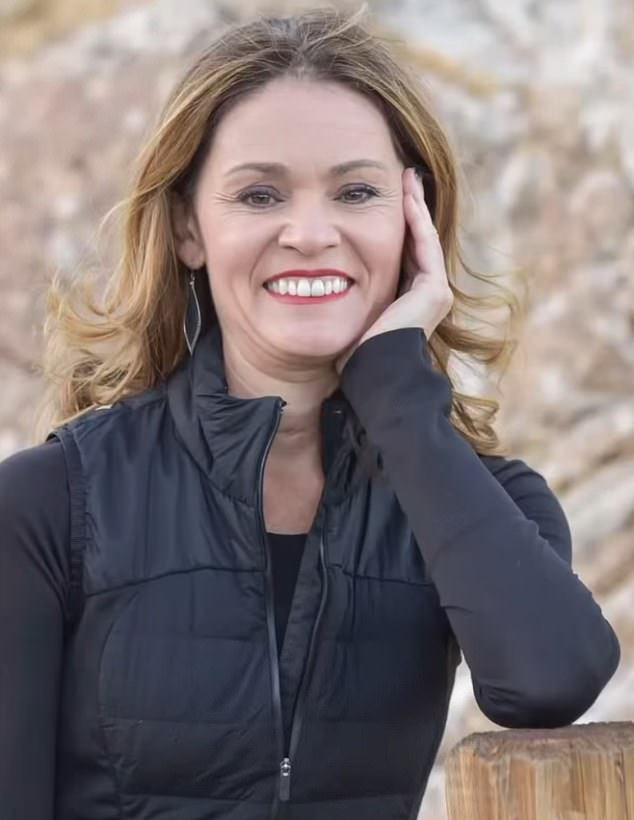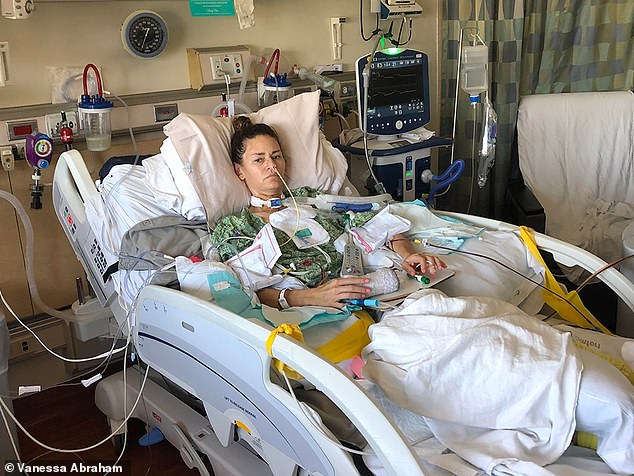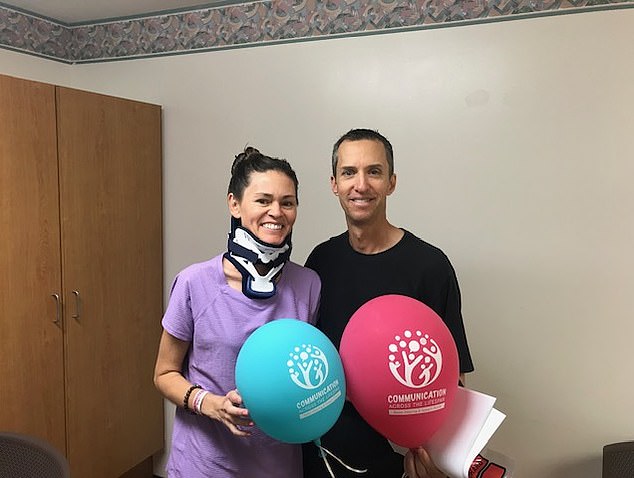Vanessa Abraham had spent her entire career helping people find their voices. So she felt it was a cruel twist of fate when she contracted a rare neurological disease that took away her ability to speak and left her paralyzed.
Mrs Abraham, 45 from California, had spent over 15 years helping children overcome speech obstacles and teaching them how to talk, but in March 2019, her life came to a standstill after she began to experience a severe case of the flu.
She suffered from extreme exhaustion, body aches, nausea and vomiting, and soon, her voice began to wane.
She was quickly taken to her local emergency room but within two days had to be moved to the intensive care unit after facing respiratory failure and progressive paralysis.
Mrs Abraham wasn’t a stranger to the ICU, having treated patients in the hospital rooms during her career. But now, she was the patient.
The mom-of-one told DailyMail.com: ‘In the ICU, I was unable to move my arm or hold my head up. The neck muscles were so weak that my neck basically fell to the side, and I had to use a neck brace to hold it up. My condition was grave to say the least.
‘I was a speech-language pathologist unable to communicate verbally.’

Vanessa Abraham, a 45-year-old mother, had spent over 15 years helping children overcome speech obstacles and teaching them how to talk when one day, she lost her own voice
While some believed she was suffering from the central nervous system disorder multiple sclerosis, others thought she had neuromyelitis optica (a rare autoimmune disorder that also affects the CNS).
However, she would go a year without a diagnosis.
But that didn’t stop her from healing. She told DailyMail.com she fought as hard as she could for her four-year-old daughter, scared she would never be able to speak to the little girl again.
She said: ‘I was unable to move myself in bed, unable to use the restroom, was tube fed via g-tube and intubated.
‘I was a speech-language pathologist unable to communicate verbally… so I had to rely on things like eye gaze and movements, letters on an alphabet board or paper to type on and text to speech app on my phone.’
Eventually, she required a tracheostomy, which creates an opening in the windpipe to insert a tube to help oxygen reach the lungs.
Because of this, she also required a passy muir valve (PMV) for communication.
A PMV is a speaking valve designed to facilitate communication for people with tracheostomies or those on ventilators.
It redirects airflow through the vocal cords, mouth, and nose, enabling speech and improving communication.
As her condition worsened, experts continued to look for answers, but came up empty. Despite this, Mrs Abraham began intensive ‘natural’ rehabilitation.
She told the website: ‘For my recovery, I took the most natural approaches I could find. I did acupuncture, cranial sacral therapy, chiropractic treatments, endermologie [massage with a device that promotes blood circulation], stretch therapy and lasers.
‘I completely avoided any prescription medications to address pain. However, I did do monthly infusions of IVIG [antibodies] per my neurologists recommendation as there was no way possible I would experience any medical complications or side effects from this form of medication.’
She also worked with another speech pathologist in the ICU, as well as during rehab to regain her voice
As months went by, she started to slowly relearn how to swallow, speak and move and was eventually sent home – still without a diagnosis – and was told to see a neurologist in hopes of finding answers.

‘I was unable to move myself in bed, unable to use the restroom, was tube fed via g-tube and intubated. Eventually I required a tracheostomy and utilized a passy muir valve (PMV) for communication,’ she told DailyMail.com

She claims that her greatest motivation was her then-four-year-old daughter whom she feared she would never speak to again
Then by June 2019, Mrs Abraham visited a new neurologist at the University of California in San Diego who recognized her symptoms.
She said: ‘It was not until a few months after exiting the hospital environment that they finally diagnosed me. It was only because I saw a new neurologist.
‘That neurologist was able to diagnose me in a few minutes based off what I was presenting with [cervical, brachial, pharyngeal paralysis]. She said she had seen this before in her career and was very confident I had the PCB-Variant of GB.’
Mrs Abraham was diagnosed with pharyngeal-cervical-brachial (PCB) variant, a rare form of Guillain-Barré syndrome (GBS).
GBS is a rare neurological disorder in which the patient’s immune system mistakenly attacks part of their peripheral nerves, responsible for sending information from the brain to different body parts and back.
The condition typically starts to spread from the feet and legs and travels to the arms and face. However in Mrs Abraham’s case, it began in her face and then went down her body – making it difficult for doctors to diagnose her.
She told DailyMail.com: ‘In the ICU they tested me for GBS but quickly dismissed it because my variant took a different course to paralysis. Typical variants ascend from the feet up, and mine took the opposite – it went top down (head to feet).’
The PCB variant of GBS causes rapid weakness in muscles of the mouth and throat, cervical spine in the neck and nerves in the shoulder.
It also causes a complete absence of reflexes in the upper limbs and arms.
Significant weakness in the mouth and throat can make it difficult to talk, swallow, chew and breathe. It can also cause a person to slur their speech, drool out of the mouth and lead to facial paralysis.
Weakness in the neck and shoulder make it hard to hold the head up and nerve problems – all symptoms Mrs Abraham was experiencing.

As months went by, she started to slowly relearn how to swallow, speak and move

Mrs Abraham pictured here with her husband as she spent time in rehab
According to BMJ Journals, most neurologists are unfamiliar with the PCB variant and often misdiagnose it as brainstem stroke, myasthenia gravis (a chronic autoimmune neuromuscular disease causing muscle weakness and fatigue) or botulism (fatal poisoning and paralysis caused by a bacteria).
The causes of both GBS and its variants remain unknown, though they are believed to be triggered by an immune system response to an infection. GBS has also been linked to the Covid vaccine.
GBS is diagnosed in about one in 78,000 people each year around the world. About one in 100,000 people are affected in the US.
While there is no known cure for GBS or any of its variants, therapies such as plasma exchange and immunoglobulin injections (proteins that your immune system naturally makes to attack invading organisms) can help alleviate symptoms and reduce recovery time if started within two weeks of developing GBS.
Most people eventually recover from even the most severe cases of GBS and healthcare professionals tend to transfer patients to rehabilitation settings to improve.
However, six years on from her life-changing diagnosis, Mrs Abraham, who is now able to speak clearly and walk, said: ‘Recovery was awful, long and required a lot of mental health services to address severe depression, anxiety and suicidal ideation.
‘I was unable to drive for nine months and eat for six. I didn’t work for a year. I had a lot of pain and discomfort and exhaustion. I napped daily and spent a lot of time in outpatient rehab, at the gym, resting, and in therapy for depression.’
She also revealed how she managed to interacte with people while re-learning how to speak: ‘I communicated with a passy muir valve that is a device that is used with a tracheostomy. It was the most exhausting, scary and difficult procedure I have ever been through in my entire life.
‘Due to the nature of my disease, it made talking again hard. I had an extremely high level of secretions that would require a lot of suctioning in order to use the PMV and talk again. It was physically exhausting. The first time I used the PMV I was able to only use it for less than a minute because it was so hard.
‘Before the PMV I used every other modality as an SLP I could think of to talk. I pointed to pictures, typed on the letter board and when severe and unable to move anything in my body I used eye gaze.’

Six years on from her life-changing diagnosis, Mrs Abraham is now able to speak clearly
Despite her recovery, Mrs Abraham told DailyMail.com that her illness forever changed her life.
She said: ‘I lost myself. I lost who I once was and had to say goodbye to many dreams for my future. I was profoundly depressed and missed myself and wanted to be the mom I envisioned I would be.
‘I am not as active as I once was. I was once able to run, hike mountains for miles and ride bikes and participate in yoga classes. I have had to stop doing all of that because I am simply not strong enough and cannot perform these tasks safely.
‘Being tube fed was depressing and isolating. I was no longer able to sit at the table and eat with my family. That is isolating. I was no longer able to work. I lost my identify as not only a mom and wife but also a SLP/working mom.
‘I no longer felt I fit into the world I once was an active participant in.
As for life now, she told DailyMail.com she still struggles – both physically and mentally.
She said: ‘I am six years out and still participate in weekly ICU support groups for PICS [post intensive care syndrome]. I am unable to sleep through the night without anxiety attacks – I have insomnia.’
Still, she is trying to move forward and raising her daughter, running a neurological rehab business called A Neu Healing where she helps patients recovery from neurological impairments.
In the end, Mrs Abrahams said: ‘Surround yourself with people that “get it” and with that I mean that people you can connect with, that understand what you are going through.
‘People that understand the grief, loss, depression and anxiety you are feeling through difficult times. For me, I found that through ICU support groups for Post Intensive Care Syndrome (PICS) and through the support of prayer warriors around the United States that experienced tragedy like mine.’







